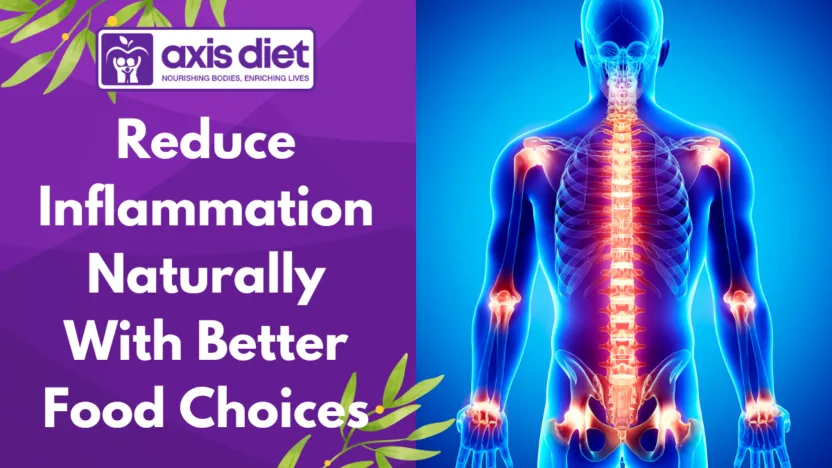Inflammation is a natural and necessary response of the body to injury or infection. However, chronic inflammation can lead to various health issues, including arthritis, heart disease, diabetes, and even cancer. The food we consume plays a pivotal role in either promoting or reducing inflammation in the body. In this article, we will explore the concept of inflammation, delve into the best anti-inflammatory foods such as turmeric and berries, identify foods that exacerbate inflammation like sugar and refined oils, and touch upon lifestyle factors that contribute to an inflammatory response. Finally, we’ll provide a sample anti-inflammatory meal plan to help kickstart your journey towards better health by utilizing the power of nutrition. Let’s uncover the strategies for reducing inflammation naturally through dietary choices.
What is Inflammation?
Inflammation is a complex biological response of the body’s immune system to harmful stimuli such as pathogens, damaged cells, or irritants. This process is characterized by redness, heat, swelling, and pain in the affected areas. There are two types of inflammation: acute and chronic. Acute inflammation is a short-term process that serves an essential purpose in healing, while chronic inflammation can become a silent, ongoing issue that harms tissues and organs over time.
Chronic inflammation often results from unbalanced lifestyle choices, including poor nutrition, lack of exercise, and ongoing stress. It can manifest in various forms, leading to numerous health complications. Understanding the importance of inflammation helps us appreciate the urgency of addressing dietary factors that either aggravate or mitigate this process. By choosing the right foods, we can help our bodies respond effectively to inflammation, promoting overall wellbeing and longevity.
Best Anti-Inflammatory Foods: Turmeric, Berries, and More
Certain foods possess anti-inflammatory properties that can help combat inflammation and support overall health. Incorporating these foods into your diet can assist in managing chronic inflammation.
- Turmeric: This bright yellow spice contains curcumin, a powerful compound known for its anti-inflammatory and antioxidant effects. Studies suggest that curcumin can inhibit the activity of inflammatory cytokines, making turmeric an excellent addition to your anti-inflammatory arsenal.
- Berries: Fruits such as blueberries, strawberries, and raspberries are rich in antioxidants known as flavonoids. These compounds help neutralize free radicals in the body, reducing oxidative stress and inflammation.
- Leafy Greens: Vegetables like spinach, kale, and Swiss chard are packed with vitamins, minerals, and antioxidants. They contain compounds that can lower inflammatory markers in the body and promote optimal health.
- Fatty Fish: Sources like salmon, sardines, and mackerel are high in omega-3 fatty acids, which are proven to fight against inflammation. Omega-3s can lower the production of inflammatory cytokines and eicosanoids.
- Nuts and Seeds: Almonds, walnuts, flaxseeds, and chia seeds are good sources of healthy fats and antioxidants. They can help reduce inflammation while also providing essential nutrients our bodies need.
- Olive Oil: Extra virgin olive oil is rich in monounsaturated fats and antioxidants, particularly oleocanthal, which has been shown to have similar effects as ibuprofen in reducing inflammation and pain.
- Garlic: Known for its numerous health benefits, garlic has anti-inflammatory properties and can stimulate the immune system. Allicin, a compound found in garlic, is responsible for many of its beneficial effects.
Incorporating these foods into your daily meals can provide your body with the nutrients it needs to fight inflammation effectively. Not only do these foods offer numerous health benefits, but they also provide delicious and versatile options for meal planning.
Foods That Cause Inflammation
While certain foods can help reduce inflammation, others can exacerbate it. Understanding which items to avoid is just as important as knowing which to include in your diet. Here are some common culprits that can promote inflammation:
- Added Sugars: High amounts of sugar found in many processed foods can trigger an inflammatory response. Excessive sugar intake is linked to obesity and the development of chronic diseases.
- Refined Carbohydrates: Foods made with white flour, such as white bread, pastries, and various snack foods, can lead to spikes in blood sugar and promote inflammation.
- Trans Fats: Often found in processed and fast foods, trans fats can increase inflammation and contribute to chronic health issues. These are typically labeled as “partially hydrogenated oils” on food packaging.
- Processed Meat: Bacon, sausage, and other processed meats have been linked to an increase in inflammatory markers. Red meat should be consumed in moderation due to these effects.
- Excess Omega-6 Fatty Acids: While omega-6 fatty acids are essential in moderation, an imbalance caused by excessive consumption of processed vegetable oils can lead to inflammation.
- Alcohol: Excessive alcohol consumption can promote inflammation in the body and should be limited for overall health.
By being mindful of these inflammatory-triggering foods, you can enhance your efforts to create a balanced, anti-inflammatory diet that supports your health and wellness goals.
Lifestyle Factors That Help Reduce Inflammation
Beyond dietary choices, several lifestyle factors can contribute significantly to reducing inflammation. Emphasizing a holistic approach can enhance your efforts towards achieving better health:
- Regular Exercise: Engaging in physical activity helps to reduce inflammation by regulating immune responses, improving circulation, and promoting weight management. Regular exercise can be a powerful tool in your fight against chronic inflammation.
- Stress Management: Chronic stress can contribute to inflammation. Incorporating practices such as yoga, meditation, or deep breathing exercises into your routine can help lower stress levels and enhance overall wellbeing.
- Quality Sleep: Getting enough restorative sleep is crucial in regulating the body’s inflammatory response. Lack of sleep can lead to an increase in inflammatory markers, emphasizing the importance of establishing healthy sleep habits.
- Hydration: Staying adequately hydrated is essential for optimal health and can help flush out toxins that could promote inflammation. Aim for at least eight cups of water daily, adjusting based on your activity level and environment.
- Smoking Cessation: Smoking is known to contribute to inflammation and increase the risk of chronic diseases. Quitting smoking can significantly reduce inflammation levels and improve overall health.
By addressing these lifestyle factors in conjunction with dietary changes, you can take a comprehensive approach to reducing inflammation and enhancing your overall health.
A Sample Anti-Inflammatory Meal Plan
Creating an anti-inflammatory meal plan can be a simple and effective way to reduce inflammation and promote health. Here’s a sample meal plan that incorporates many of the foods known for their anti-inflammatory properties:
| Meal | Plan |
| Breakfast | 1. Turmeric Oats with Nuts & Seeds • Rolled oats cooked with almond milk, turmeric, cinnamon, and honey. • Topped with walnuts, flaxseeds, and fresh berries. 2. Methi (Fenugreek) Paratha with Yogurt • Whole wheat methi paratha cooked in minimal ghee. • Served with homemade unsweetened probiotic-rich yogurt. |
| Snack | • A handful of almonds, walnuts, and pumpkin seeds. • Green tea infused with ginger and tulsi (holy basil). |
| Lunch | 1. Khichdi with Dal & Vegetables • Moong dal and brown rice cooked with turmeric, cumin, ginger, and a variety of vegetables like carrots, beans, and spinach. 2. Curd with Flaxseeds • A small bowl of homemade curd mixed with ground flaxseeds and black salt. 3. Mixed Sprout Salad • Sprouted green gram and chickpeas with tomatoes, onions, coriander, and lemon juice. |
| Evening Snack | 1. Grilled Fish or Paneer with Sauteed Greens • Grilled salmon or paneer marinated with turmeric, lemon juice, and coriander. • Served with stir-fried spinach, garlic, and mustard seeds. 2. Quinoa Vegetable Pulao • Quinoa cooked with cumin, cardamom, peas, bell peppers, and onions. |
| Dinner | 1. Moong Dal Chilla with Avocado Chutney • Moong dal chilla (savory pancake) made with turmeric, cumin, and grated vegetables like carrots and spinach. • Served with avocado chutney (mashed avocado, lemon juice, coriander, green chili, and garlic). 2. Vegetable Dal with Brown Rice • Yellow moong dal or masoor dal cooked with turmeric, cumin, garlic, and tomatoes. • Served with steamed brown rice and a side of sautéed greens (like methi or spinach). 3. Millet Roti with Baingan Bharta (Smoky Eggplant Mash) • Bajra or jowar roti, high in fiber and great for gut health. • Baingan bharta, made by roasting eggplant and mixing it with garlic, ginger, tomatoes, and mustard oil. 4. South Indian-Style Vegetable Stew with Coconut Milk • A Kerala-style vegetable stew made with carrots, beans, peas, and coconut milk, flavored with curry leaves and black pepper. • Served with red rice or quinoa dosa. 5. Grilled Tandoori Tofu or Fish with Stir-Fried Vegetables • Tofu or fish marinated with turmeric, ginger-garlic paste, lemon juice, and mustard oil, grilled or pan-seared. • Served with stir-fried broccoli, capsicum, and mushrooms in a light garlic-olive oil dressing. 6. Rajma with Quinoa or Brown Rice • Red kidney beans (rajma) cooked in a tomato-based gravy with turmeric, cinnamon, cumin, and ginger. • Served with fiber-rich quinoa or brown rice for better digestion. 7. Sautéed Mushrooms with Garlic & Ajwain Roti • Mushrooms sautéed in olive oil, garlic, and black pepper (great for reducing inflammation). • Served with ajwain (carom seed) roti to aid digestion. 8. Methi Thepla with Cucumber Raita • A whole wheat methi (fenugreek) thepla cooked with turmeric and served with cucumber raita (yogurt, mint, and black salt). 9. Chana Masala with Cauliflower Rice • Chickpeas cooked with ginger, garlic, turmeric, and tomatoes. • Served with cauliflower rice instead of regular rice for a lighter option. 10. Palak Paneer with Amaranth (Rajgira) Roti • Palak paneer made with fresh spinach, garlic, and minimal cream. • Served with gluten-free rajgira roti, rich in micronutrients. |
This meal plan highlights the diversity and deliciousness of anti-inflammatory foods while promoting balanced nutrition and satisfaction throughout the day. Adjust portions and ingredients to meet your personal preferences and dietary needs.
Conclusion
Reducing inflammation naturally through diet involves understanding both the foods that foster inflammation and those that can combat it. By incorporating powerful anti-inflammatory options such as turmeric, berries, and leafy greens, while avoiding processed foods and sugar, individuals can significantly improve their health. Additionally, adopting a holistic lifestyle that includes regular exercise, stress management, adequate sleep, hydration, and avoiding tobacco enhances these dietary efforts. By following a structured anti-inflammatory meal plan, you can support your body in fighting back against chronic inflammation, thereby paving the way for better health outcomes and overall well-being.
Axis Diet is dedicated to empowering individuals with knowledge and practical advice for healthier living. Our articles, grounded in research and expert insights, aim to simplify complex nutritional concepts, offering a comprehensive understanding of various aspects of diet and wellness. While these articles are informative and a great starting point for anyone looking to improve their health, they are for informational purposes only. For personalized, professional guidance tailored to your unique health needs, we encourage you to consult with Axis Diet’s registered dietitians. Reach out to us for expert personalized guidance on your nutritional journey.





